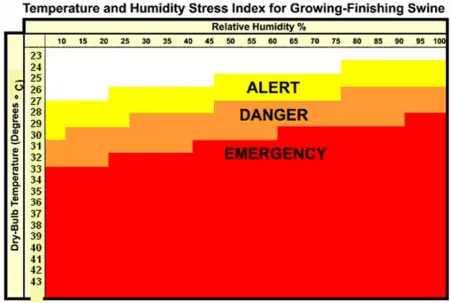Heat stress: attacking the well-being of every pig

Recent American research* has investigated the far-reaching consequences of heat stress in pigs. The economic consequences of heat stress are estimated at billions of dollars in losses in global livestock farming and the cost for the American pig industry alone is a staggering 300 million dollars a year.
The researchers came to the generally accepted conclusion that an elevated ambient temperature causes stress for the animal. They found that the intestines were one of the organs that suffers the most from the excessive heat. The reason is that the pig, due to the absence of sweat glands, will pump the blood to the skin in order to lose its heat. However, this results in a limited blood flow to the intestines and thus causes damage to the intestinal inner lining. These cells will lack oxygen and become permeable.(leaky gut) This causes all kinds of harmful substances to enter the bloodstream and it will lead to a general inflammation or infection.
The researchers concluded that pigs subjected to an acute heat stress of 35 ° C, over a period of only 24 hours, had already a rectal temperature of 41 ° C. The feed intake decreased by half (this is a natural reflex to reduce heat production from digestion),they doubled their respiratory rate and they lost 2 kg of body weight in 1 day.
The treatment options for heat stress are limited. Even human treatment does not go beyond cooling and rehydration. So, prevention is key! The Lianol product range does help to combat the adverse effects caused by heat stress. Lianol has a direct and positive influence on the defense system of the intestinal epithelium (inner lining of cells) and on the specific structure of the small intestine (tight junctions). This helps to limit the adverse effects of heat stress. The intestine will show fewer "leaks". Lianol also helps to minimize the negative influence of heat stress on the fertility of sows. Indeed, there is abundant scientific proof that heat stress even has a lasting negative impact on future piglets. Therefore, always prefer prevention over any cure and prevent a beautiful and warm summer turning into a bleak fall.
Practical tips to reduce heat stress:
- Increase the ventilation speed. It can have a major effect.
- Reduce the stable occupancy if possible
- Lower the temperature of the drinking water
- Avoid feeding the animals during the hottest moment of the day
- Add electrolytes and antioxidants (Vit E)
- Increase the energy value of the feed
- Reduce the fiber content in the feed
* Source: Heat stress reduces intestinal barrier integrity and favors intestinal glucose transport in growing pigs
doi: 10.1371 / journal.pone.0070215
Published 12/04/2018
* Source: Physiological consequences of heat stress in pigs
doi: 10.1071 / AN15267
Published 21/10/2015"
